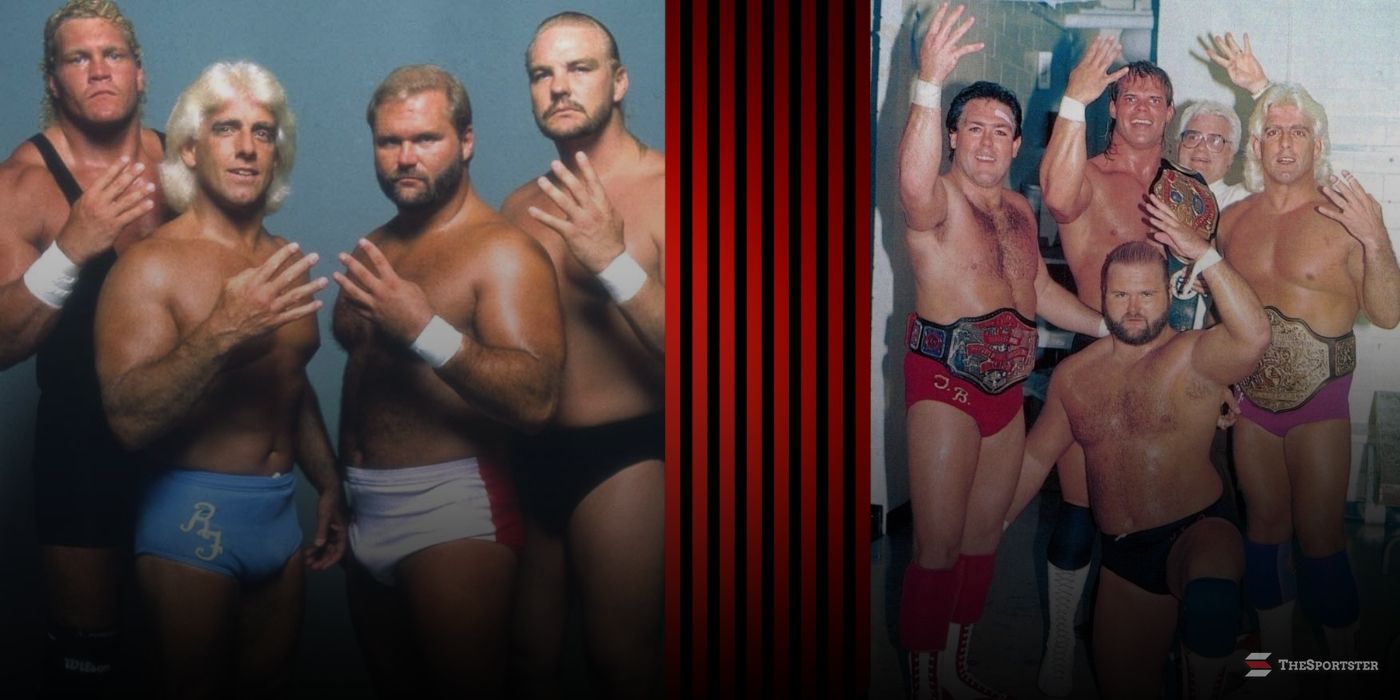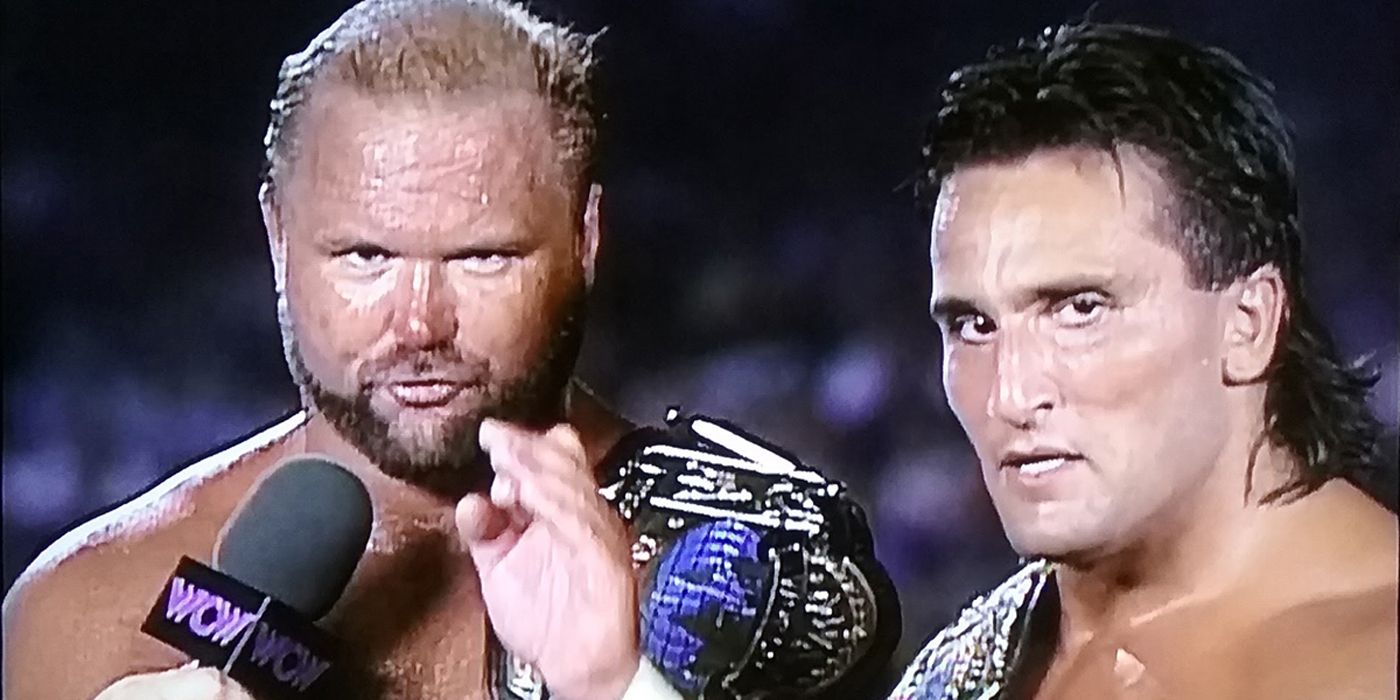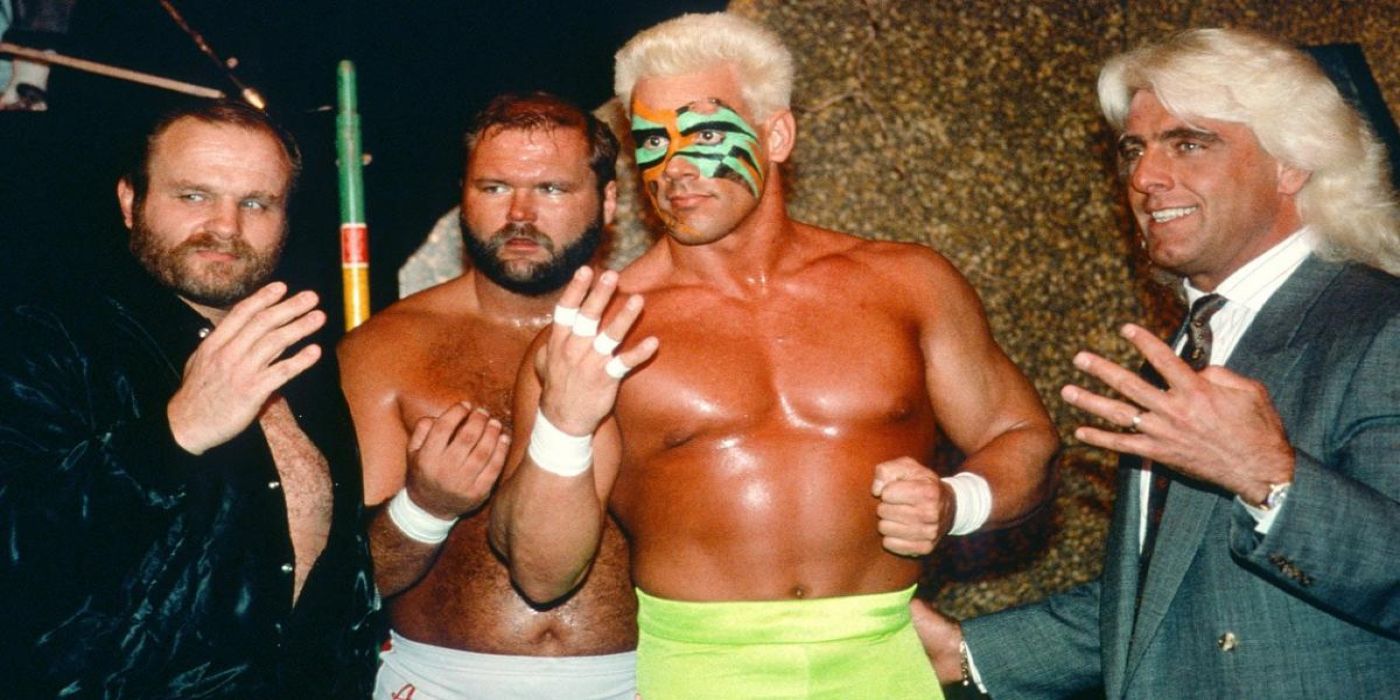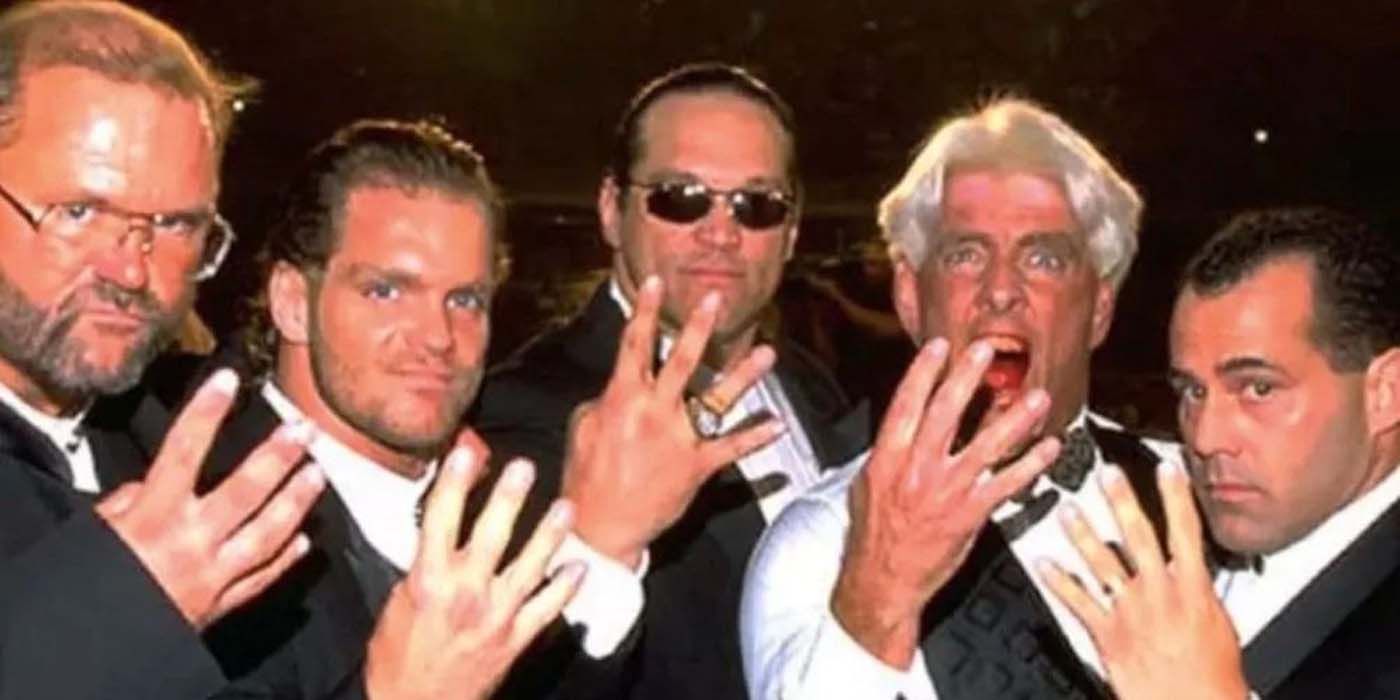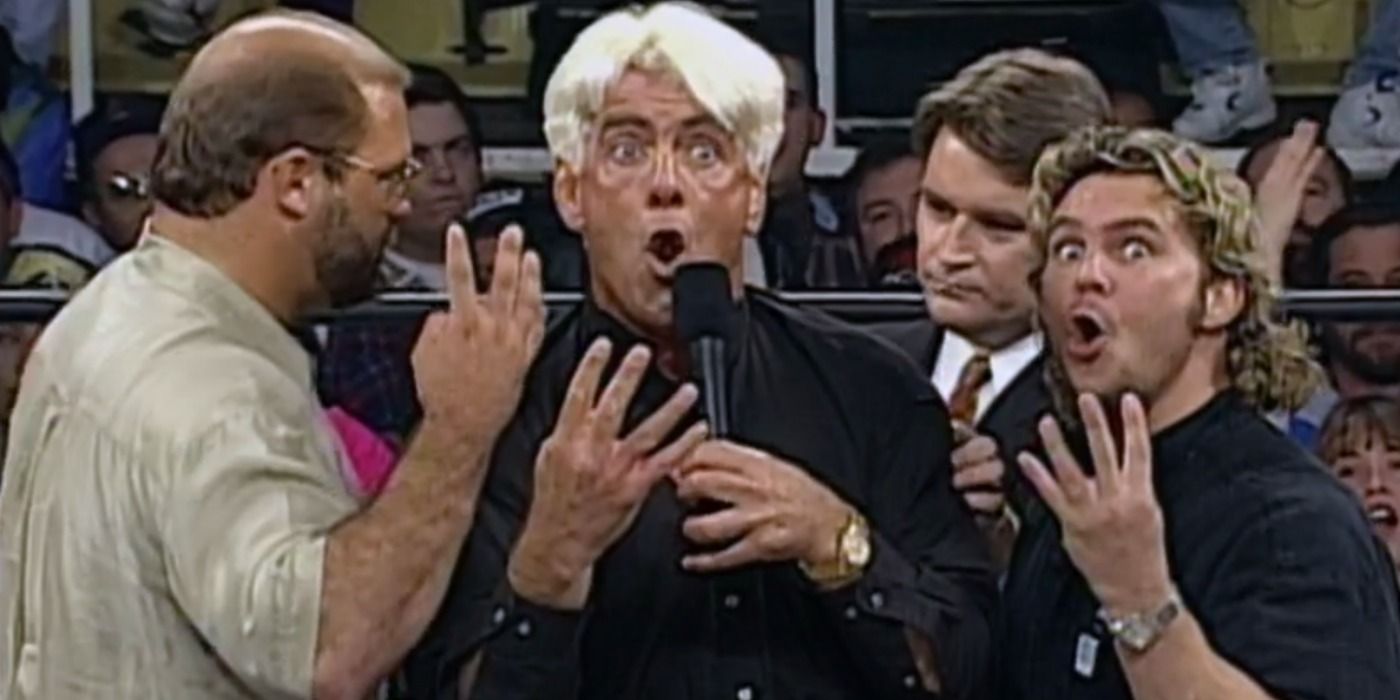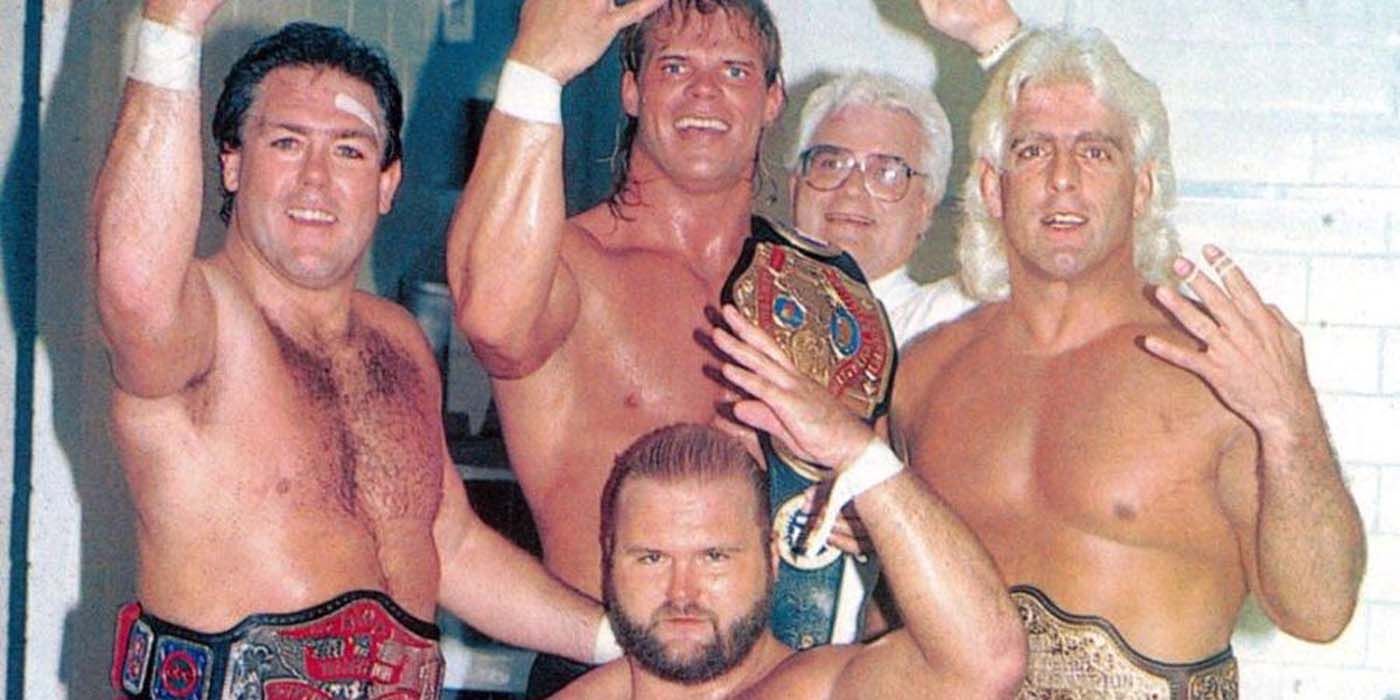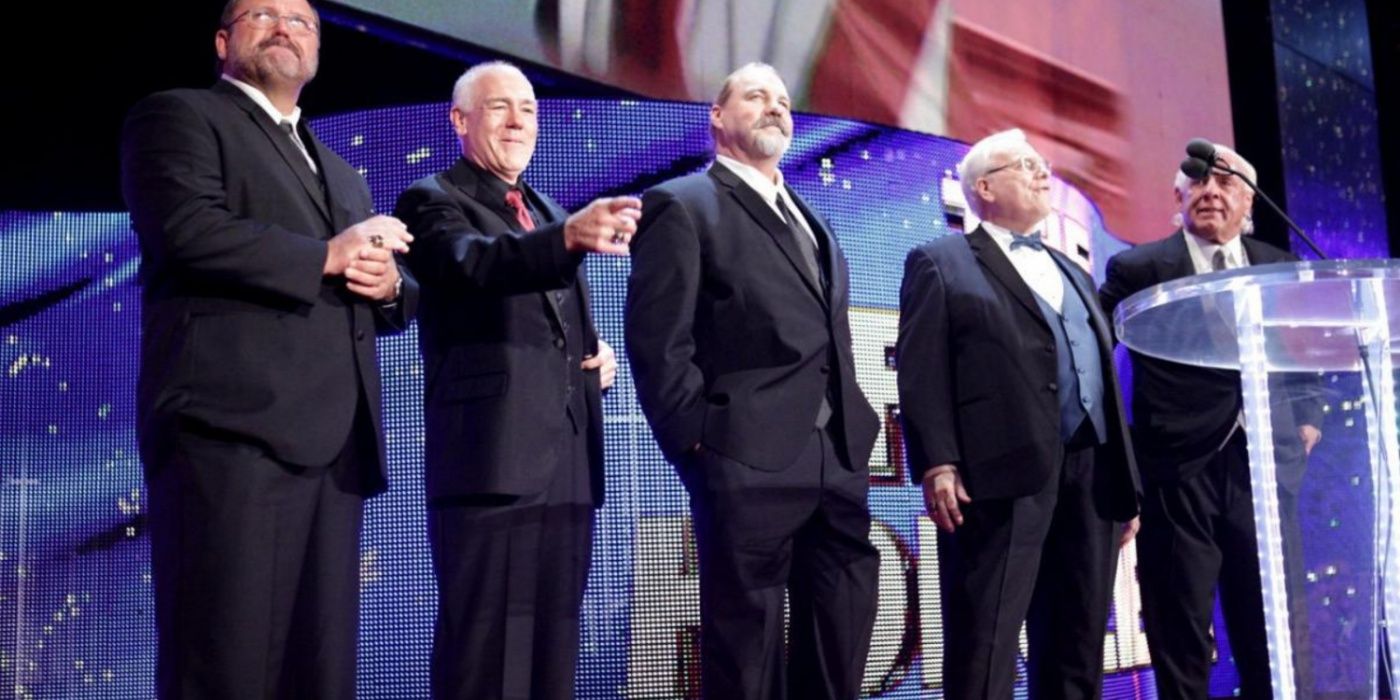Read update
- A great faction in professional wrestling can do a lot for someone's career. When it comes to the Four Horsemen, that was no exception. Despite their name, there were way more than four people who were members of the group. Originally formed in 1985, the group went through numerous different changes throughout their history with different members. There were numerous different iterations of the group, with varying degrees of success to all of their names. While they do go down in history as one of the most important factions in history, however, it depends on which version of the group is being talked about.
In the '80s, there was no bigger or better faction than The Four Horsemen in the NWA and in the '90s, they remained one of the strongest factions in WCW. While WWE had stables of its own in the Heenan Family and Hart Foundation and WCW previously had a major faction in the original Legion of Doom, nothing matched up to the star power and success of the Horsemen.
However, all good things have to end. While the Horsemen started in 1985, the original iteration ended in 1991 before returning for a six-year run in the '90s. While there have been many members, there were basically eight versions of the Four Horsemen, most involving Ric Flair and Arn Anderson as the core members, and not all of them were successful.
|
Championship |
Four Horsemen Member |
Total Reigns |
|---|---|---|
|
NWA National Championship |
Tully Blanchard |
1 |
|
NWA National Tag Team Championship |
Ole & Arn Anderson |
1 |
|
NWA/WCW United States Championship |
Tully Blanchard |
1 |
|
NWA/WCW United States Championship |
Lex Luger |
1 |
|
NWA/WCW United States Championship |
Barry Windham |
1 |
|
NWA/WCW United States Championship |
Ric Flair |
1 |
|
NWA/WCW United States Championship |
Steve McMichael |
1 |
|
NWA World Championship |
Ric Flair |
6 |
|
NWA/WCW World Tag Team Championship |
Arn Anderson & Tully Blanchard |
2 |
|
NWA/WCW World Tag Team Championship |
Arn Anderson & Paul Romo |
1 |
|
NWA/WCW World Tag Team Championship |
Chris Benoit & Dean Malenko |
1 |
|
NWA/WCW TV Championship |
Arn Anderson |
4 |
|
NWA/WCW TV Championship |
Tully Blanchard |
3 |
|
WCW World Championship |
Ric Flair |
8 |
UPDATE: 2024/04/19 11:30 EST BY BENJAMIN VIEIRA
A great faction in professional wrestling can do a lot for someone's career. When it comes to the Four Horsemen, that was no exception. Despite their name, there were way more than four people who were members of the group. Originally formed in 1985, the group went through numerous different changes throughout their history with different members. There were numerous different iterations of the group, with varying degrees of success to all of their names. While they do go down in history as one of the most important factions in history, however, it depends on which version of the group is being talked about.
1993: Ric Flair, Arn Anderson, Paul Roma, Ole Anderson
It Was The Worst Era Of The Horsemen
- Joined forces from May 1993 to December 1993
- This group never won any titles.
Most fans of the Four Horsemen consider Paul Roma as the worst member of the group in history. In WWE, Roma was a tag team wrestler and was never even a great one there, other than his teaming with Hercules for a short time.
In 1993, WCW tried to bring back the Horsemen, but there was something big missing. Ric Flair and Arn Anderson were back, Roma as the third member, and that was it. Ole Anderson showed up once, but he retired and was never really part of this.
1989 Revival: Ric Flair, Ole Anderson, Arn Anderson, Sting
Sting, One Of The Group's Biggest Rivals, Joined Them
- Joined forces from December 1989 to February 1990.
- Ric Flair was world champion, but that was the only title they held during this reign.
In 1989, the Four Horsemen slowly ended when Arn Anderson and Tully Blanchard left for WWE, and Ric Flair fired JJ Dillon and starred working as part of Yamazaki Corporation. In 1989, Arn was back, and WCW brought back the Four Horsemen with Arn, Ole, Flair, and Sting.
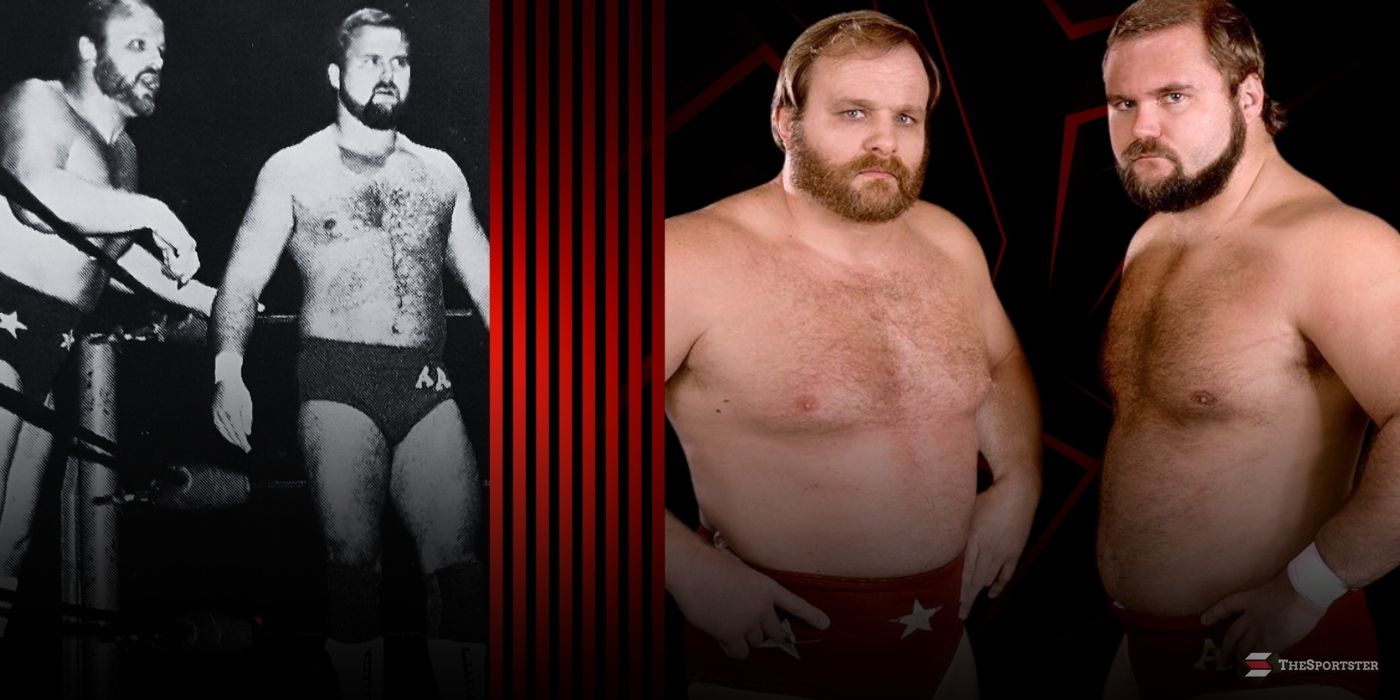
Arn Anderson & Ole Anderson's Real-Life Relationship, Explained
Arn and Ole Anderson were famously family and half of the original Four Horsemen, but their real relationship didn't match the storylines.That was the biggest problem with this version — they were babyfaces. When Sting won a chance for a world title shot, the Horsemen attacked him and turned heel, becoming instantly better after this iteration ended.
1990: Ric Flair, Arn Anderson, Barry Windham, Sid Vicious
Sid Vicious Never Really Fit In The Group
- Joined forces from May 1990 until May 1991.
- Ric Flair was world champion twice during this reign.
- Arn Anderson held the TV Championship once.
After The Four Horsemen kicked Sting out of the group, they were automatically better because they were heels again. Ole Anderson completely stopped wrestling, and Barry Windham returned, which made it even better.
What holds this version down from some others was the addition of Sid Vicious. He never really fit the mold of a team player ever in his career. Plus, WCW was not fully behind the idea at this time, and this version lasted a year before Flair and Vicious both left for WWE.
1998: Ric Flair, Mongo McMichael, Chris Benoit, Dean Malenko
The Horsemen Lost A Lot To The nWo
- Joined forces from September 1998 until May 1999.
- Ric Flair won the world title once during this reign.
- Chris Benoit and Dean Malenko won the tag team titles once.
In 1998, WCW was in the midst of the nWo era, but fans were molten hot for the Four Horsemen's possible return. Chris Benoit and Dean Malenko were petitioning the retired Arn Anderson to give his blessing to reform the stable.
Finally, it happened when Ric Flair showed back up, and the place exploded. This reformation ranks near the top of Four Horsemen moments, but after they formed, WCW basically fed The Four Horsemen to the nWo.
1995: Ric Flair, Arn Anderson, Brian Pillman, Chris Benoit
Pillman Added A Lot To The Group
- Joined forces from October 1995 until September 1997.
- Ric Flair won the world title two times during this reign.
- Ric Flair also held the United States Championship once during this time.
One of the craziest versions of the Four Horsemen came in 1995. Ric Flair and Arn Anderson were in the midst of a short feud when Arn brought in a newly-turned heel Brian Pillman to help him. Flair got Sting to help him, betrayed him, and the Four Horsemen reformed with Pillman and the newly added Chris Benoit to the group.
Pillman was at the start of his loose-cannon persona, and his real-life feud with Kevin Sullivan almost destroyed the Horsemen, but this was still a stable that brought a lot of excitement to WCW. Sadly, Pillman's feud with Sullivan led to him eventually leaving, and the group slowly disbanded.
Original Four Horsemen - Arn Anderson, Ole Anderson, Ric Flair, Tully Blanchard
They Formed Together In 1985
- Joined forces from 1985 until February 1987.
- Ric Flair held the NWA Championship twice during this reign.
- Tully Blanchard held the Television Championship three times.
- Arn Anderson held the Television Championship once.
- Tully Blanchard held the National Championship once.
- Tully Blanchard held the United States Championship once.
The Four Horsemen were at the top of their game in the NWA. Ric Flair was the world champion, Tully Blanchard was feuding with Magnum T.A. for the U.S. Championship, and the Anderson brothers were tearing up the tag team scene.
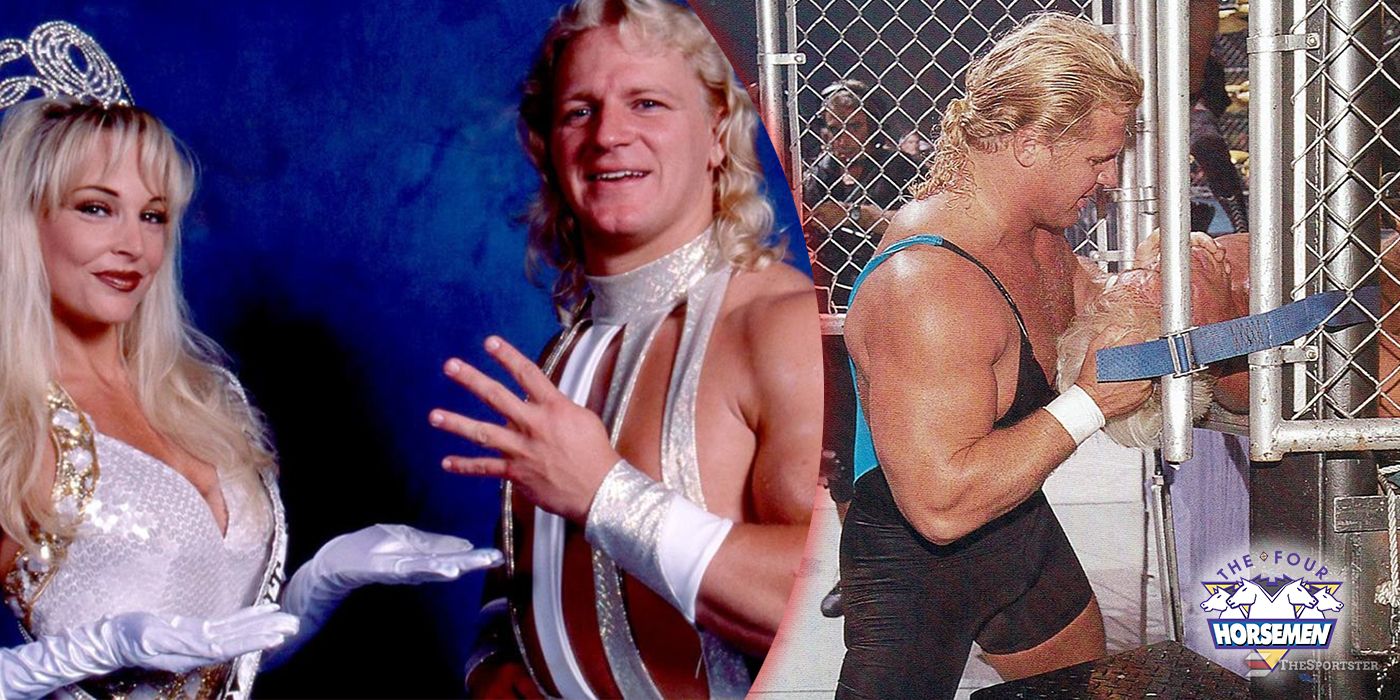
10 Harsh Realities Fans Of The Four Horsemen Need To Realize
As great as they were, it’s rare that anything in wrestling is totally perfect, and The Four Horsemen are no exception.This was the original Four Horsemen, formed with the storyline that Flair and the Andersons were stars, and Blanchard was the next big thing. They formed to protect Flair's world title, and the rest of the group became stars. The only thing that really held down this version of the Horsemen was Ole Anderson, who was past his prime.
|
Year |
PWI Award |
Recipients |
|---|---|---|
|
1985 |
Wrestler Of The Year |
Nature Boy Ric Flair |
|
1986 |
Wrestler Of The Year |
Nature Boy Ric Flair |
|
1986 |
Match Of The Year |
Ric Flair vs. Dusty Rhodes |
|
1987 |
Most Hated Wrestler Of The Year |
Nature Boy Ric Flair |
|
1987 |
Feud Of The Year |
Four Horsemen vs. Super Powers & Road Warriors |
|
1988 |
Feud Of The Year |
Ric Flair vs. Lex Luger |
|
1988 |
Manager Of The Year |
J.J. Dillon |
|
1989 |
Wrestler Of The Year |
Nature Boy Ric Flair |
|
1989 |
Match Of The Year |
Ric Flair vs. Ricky Steamboat |
|
1989 |
Feud Of The Year |
Ric Flair vs. Terry Funk |
|
1990 |
Feud Of The Year |
Ric Flair vs. Lex Luger |
1987: Ric Flair, Arn Anderson, Tully Blanchard, Lex Luger
This Version Brought The Group Up Another Level
- Joined forces from February 1987 until January 1988.
- Ric Flair was world champion twice during this reign.
- Arn Anderson and Tully Blanchard won the NWA Tag Team Championship once.
- Tully Blanchard was the TV Champion once.
- Lex Luger was the United States Champion once.
In 1987, The Four Horsemen improved in every way. Ole Anderson left the group, and as the older member who was never that great in the ring, to begin with, the Horsemen were much more exciting to watch. Tully Blanchard moved into the tag team scene, and his pairing with Arn Anderson was much better than the Anderson brothers.
Lex Luger was there to fight for the U.S. Title, and Flair was still the world's best World Champion at the time. This unit won several titles, but it was Luger's hunger for the top title that ended his stay in the Four Horsemen.
1989: Ric Flair, Arn Anderson, Tully Blanchard, Barry Windham
A Hall Of Fame Worthy Line-Up
- Joined forces from April 1988 until Early 1989.
- Ric Flair was world champion once during this reign.
- Arn Anderson and Tully Blanchard won the NWA Tag Team Championship once.
- Barry Windham won the United States Championship once.
In 1989, the best version of the Four Horsemen in history was formed. Arn Anderson and Tully Blanchard were still one of the best technical tag teams in the sport. Ric Flair turned in instant classics in his world title defenses no matter who he was wrestling, and Barry Windham was an upgrade offer Luger in every conceivable way.
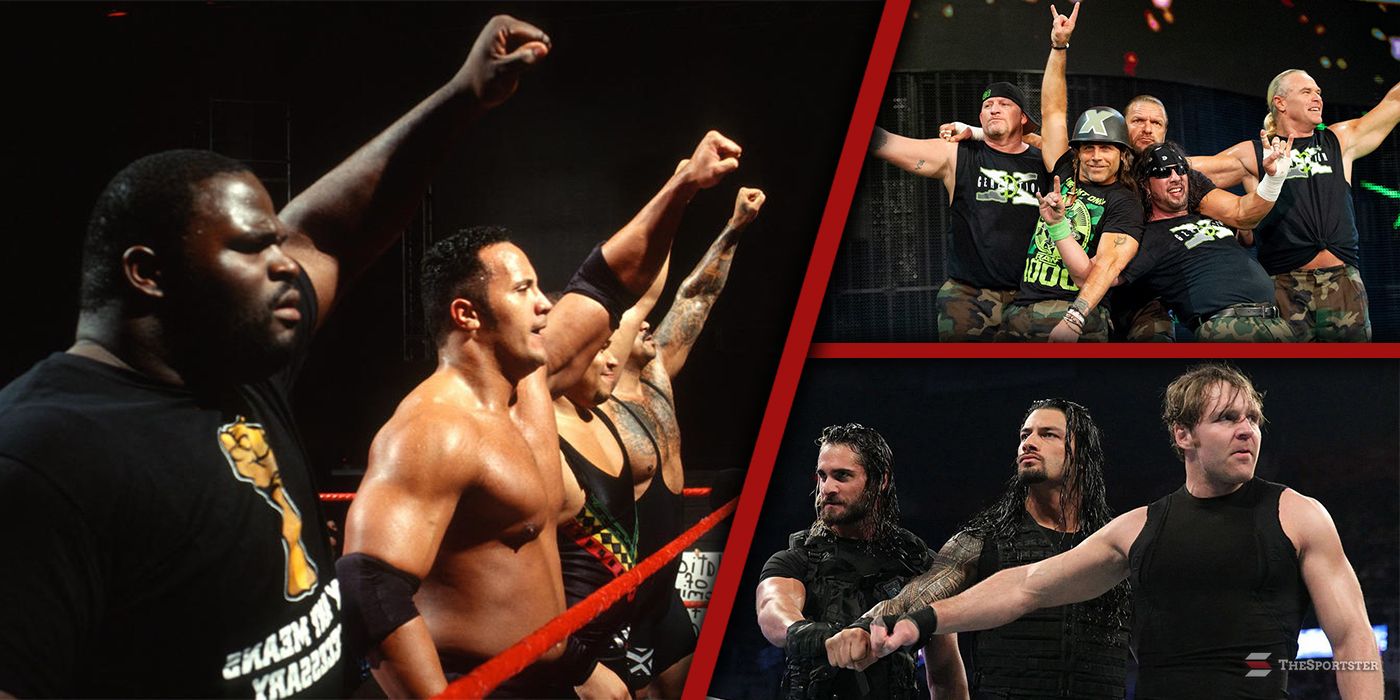
10 Wrestling Stables Better Than The Four Horsemen
While many fans and critics alike consider The Four Horsemen the greatest stable in pro wrestling history, other factions were arguably better.This was the most well-oiled unit in Horsemen history, and it is these four men who WWE invited to the induction of the Four Horsemen into the WWE Hall of Fame.

